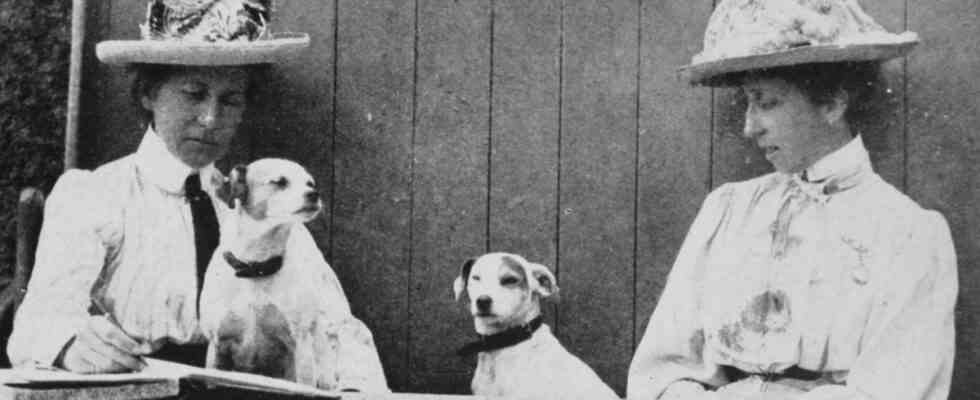It’s terribly easy to misbehave as a tourist. And it doesn’t even have to have bad intentions. Yes, you don’t even have to be a particularly stranger to unwittingly break the norm: Irish cousins Edith Œnone Somerville and Violet Florence Martin, for example, caused a lot of mischief when they stumbled among native animals in the western Irish region of Connemara.
As if there were a herd of cattle and a seemingly abandoned bulldog. The two ladies, out on a hike, had previously talked about the two phlegmatic dogs of the hotel they stayed at on their tour of Connemara in the summer of 1890. And about the corrosive influence of hotel life, in general as well as specifically, related to these two dogs.
Well, the mastiff was obviously not a hotel dog, instead it looked menacing to Somerville and Martin. Which is why the former pulled out the revolver she was carrying, fingered one of the cartridges she was carrying in her luggage along with her hair rollers, and pulled the trigger. Instead of the dog, the cattle ran away, which in turn must have suggested to the dog that the bang was the beginning of a hunt. Which is why he chased after the cattle and bit the nose of one of the animals.
The best there is to say about this incident: everyone survived it. In addition, of course, it definitely lends itself to be told. And the unconventional big cousins understood this very well. They were – at least – a working couple, publishing novels, short stories, newspaper articles together and travelogues like this one about Connemara, where they traveled by donkey cart. This fact alone provides a whole series of good anecdotes.
Encountering a mastiff and cattle – all survived. The illustrations are by Edith Œnone Somerville, Violet Florence Martin published under the male pseudonym Martin Ross.
(Photo: Aviva Verlag)
Somerville was mainly responsible for the illustrations, Martin, who published under the male pseudonym Martin Ross, mostly for the writing. Together they were Somerville & Ross. “Through Connemara” is a very funny, witty little book. Because in their descriptions, the two women oscillate between a sympathetic form of hubris and a great deal of self-mockery. You learn almost nothing about landscapes and sights, but a lot about mentalities and customs. And about questions of attitude, some of which can still be encountered today when on the move. For example, whether it wasn’t “unappetizing, even animalistic” to eat food that was brought with you on moving trains.
Better current stories than well-tried stories from Nobel Prize winners
Meanwhile, the anthology “Ireland. A Literary Invitation” edited by Paul McVeigh is completely rooted in the present. This is surprising insofar as such collections of excerpts from texts usually bring together what has been found in the literature about a country or region over the centuries. With McVeigh, however: no Yeats, no Beckett, no Böll. So not a line from the first two Irish Literature Nobel Prize winners and the associated German. Not even from the criminally ignored Joyce. Only one poem by the third and youngest Irish prizewinner, Seamus Heaney (1939-2013), has found its way into it: “Beacon on May Day”. A text that welcomes strangers and their influence on everything native.
For this volume, Paul McVeigh has selected almost exclusively texts that have been written in the past three or four years, some specifically for this anthology. They are literary texts, not travelogues. And yet this book prepares you better for a visit to Ireland – including Northern Ireland – than most guidebooks can. Because at its core, it is always about attitudes on the island, about the wounds of division, the consequences of Brexit, about the effects of recent economic booms and busts. It’s about a connection to one’s homeland against the background of the desolation of the rural area, which one might find picturesque as a tourist. About the fact that suicide and homosexuality have only been decriminalized for twenty years, which has shaken the old order, but has not yet automatically led to the rapid loosening of “the grip of their bony hand around the neck of their youth”, as Dave Lordan in ” memoir” writes.
Current attitudes towards life collide in the stories and create friction. The everyday life of the people is reflected – and what Ireland and Northern Ireland stand for today.
Paul McVeigh (ed.): Ireland. A literary invitation. Translated from Irish English by Hans-Christian Oeser and others. Verlag Klaus Wagenbach, Berlin 2022. 144 pages, 19 euros.
Somerville & Ross: Through Connemara. With the donkey cart in Ireland. Translated from the English by Elvira Willems. Aviva Verlag, Berlin 2022. 168 pages, 20 euros.

